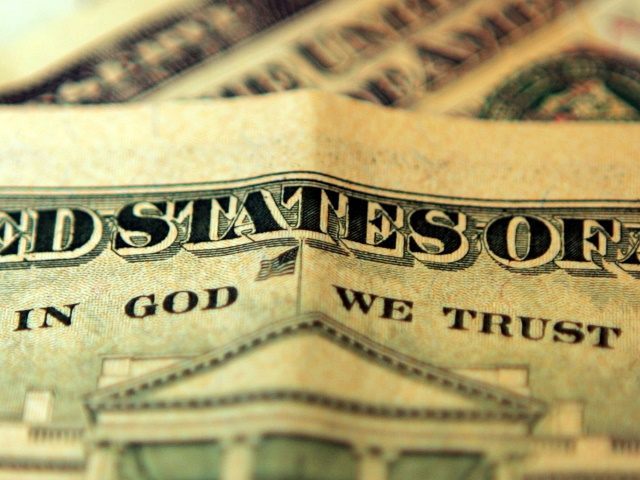The American Civil Liberties Union (ACLU) has reportedly raised more than $24 million in online donations in the wake of the group’s stance against President Donald Trump’s temporary halt on refugees while the government revamps its flawed security screening process.
Leaders of major tech firms were helpful in promoting a campaign of donations to the ACLU, prompting Vanity Fair to note that Silicon Valley “relies more than most industries on access to high-skilled immigrant labor.”
The New York Times reported on the donations, which included vast numbers of individual donors:
The ACLU has raised more than $24 million in online donations since Saturday, the first full day of the immigration ban, said Stephen Smith, a spokesman for the group. That is nearly seven times as much raised online in 2015, roughly $3.5 million, he added.
Those donations came from at least 356,306 individual donors, and about two-thirds of those who gave money were believed to be first-time donors, said its executive director, Anthony D. Romero.
“The response from the public has been remarkable,” Mr. Romero said. “It clearly shows that people are exercised over the proposed policies of Donald Trump.”
Vanity Fair reported on the involvement of Big Tech in helping to spur some donations:
Front and center amid the outpouring were tech leaders in Silicon Valley, which relies more than most industries on access to high-skilled immigrant labor. Prominent venture capitalists pledged to match donations from their Twitter followers, and executives made public donations on behalf of their start-ups.
Instacart CEO Apoorva Mehta donated $100,000 during the campaign.
Prominent social media investor Chris Sacca tweeted a pledge to match donations to the ACLU up to $75,000.
I'm inspired by all who are barely scraping by yet still giving monthly to the @ACLU. 🙏🏼
Show me your receipts and I'll match 'em to $75k. https://t.co/dej1dXag3a
— Chris Sacca (@sacca) January 28, 2017
Aaron Levie, the CEO of the Box cloud storage company, advertised that he was donating.
Donating to the @ACLU today. We cannot let America turn into a closed off, fearful country. We're better than this.
— Aaron Levie (@levie) January 28, 2017
Buzzfeed reported on another tech pledge:
On Sunday Fred Wilson of Union Square Ventures, another well-known tech investor, wrote a post on AVC, his widely-read blog, entitled “Make America Hate Again,” where he pledged to donate “a nice chunk of change to the ACLU” every month to help the organization “fight the institutionalized hatred, racism, and bigotry that this administration is foisting upon us.”
After raising enormous sums, the ACLU is reportedly turning to Silicon Valley for some advice on what to do next.
Vanity Fair reported:
Now, days after raising so much money from the Bay Area, the ACLU is turning back to Silicon Valley to help figure out how to spend it. On Tuesday, 31-year-old Sam Altman, the president of famed start-up accelerator Y Combinator, announced that the ACLU would be joining Y.C.’s winter 2017 batch of start-ups. “The ACLU has always been important, but has a particularly important role right now,” Altman wrote in a Medium post. “We are honored to be able to help, and we will send some of our team to New York for the rest of the batch to assist.”
The ACLU will inevitably benefit from Y Combinator’s vast network of advisers, start-ups, and investors. Y Combinator will also provide some funding to the ACLU, though it won’t take an equity stake in the nonprofit as it would a typical start-up. While it’s not the first time Y Combinator has mentored nonprofits—in the past, nonprofit organizations that have received help from Y.C. include DemocracyOS and the Detroit Water Project—it is unusual for a nearly hundred-year-old institution to team up with a tech upstart to receive guidance on funding allocation. Still, if there’s one thing Silicon Valley V.C.’s know, it’s how to spend money.
The ACLU has positioned itself as one of the top left-wing groups opposing Trump’s initiatives
Besides helping to lead protests against the temporary refugee ban, Breitbart Jerusalem reported on Saturday that lawyers from the ACLU and other groups financed by billionaire George Soros, a champion of open border policies, were signatories to a lawsuit filed that day to block Trump’s refugee order.
In response to the lawsuit, U.S. District Judge Ann Donnelly issued an emergency order that temporarily blocked U.S. authorities from deporting those from the nations listed in Trump’s executive order.
The ACLU is massively funded by Soros’s Open Society Foundations, including a $50 million grant in 2014.
Another signatory to the lawsuit was the National Immigration Law Center. The New York Times reported the Center raised $269,000 in donations in the wake of the executive order.
In the past, the National Immigration Law Center received numerous Open Society grants earmarked for general support.
These same groups were silent when Obama’s State Department in 2011 reportedly imposed a six month freeze on the processing of Iraqi refugees. The halt was the result of the discovery of two al-Qaeda members admitted as refugees from Iraq who were living in Bowling Green, Kentucky and admitted to targeting U.S. troops in Iraq.
The Washington Examiner found five other instances of Obama temporarily banning immigrants over national security concerns.
Trump’s executive order halts visas for 90 days for “immigrants and non-immigrants” from Syria, Somalia, Sudan, Libya, Yemen, Iran and Iraq. The order further suspended the entry of all refugees for 120 days, indefinitely blocked Syrian refugees from entering and lowered the ceiling to 50,000 for refugees allowed to enter the U.S. during Fiscal Year 2017.
Aaron Klein is Breitbart’s Jerusalem bureau chief and senior investigative reporter. He is a New York Times bestselling author and hosts the popular weekend talk radio program, “Aaron Klein Investigative Radio.” Follow him on Twitter @AaronKleinShow. Follow him on Facebook.
With additional research by Joshua Klein.

COMMENTS
Please let us know if you're having issues with commenting.